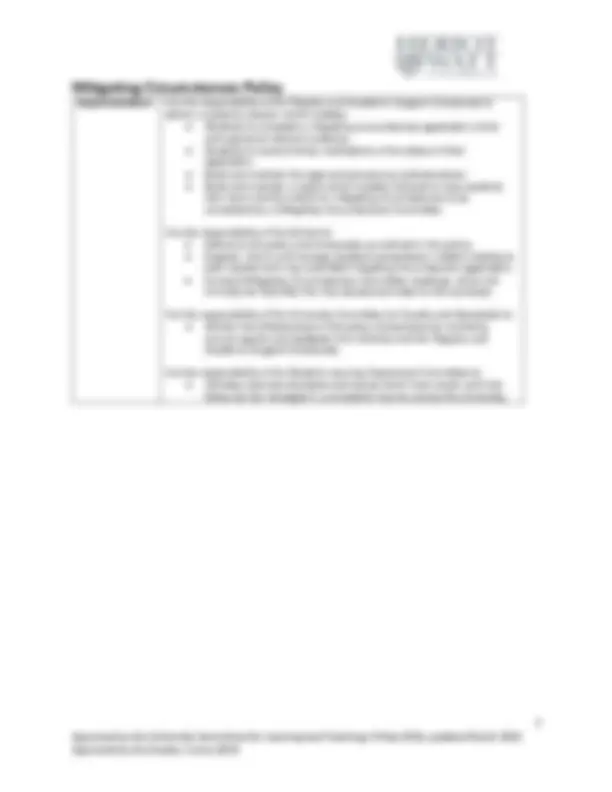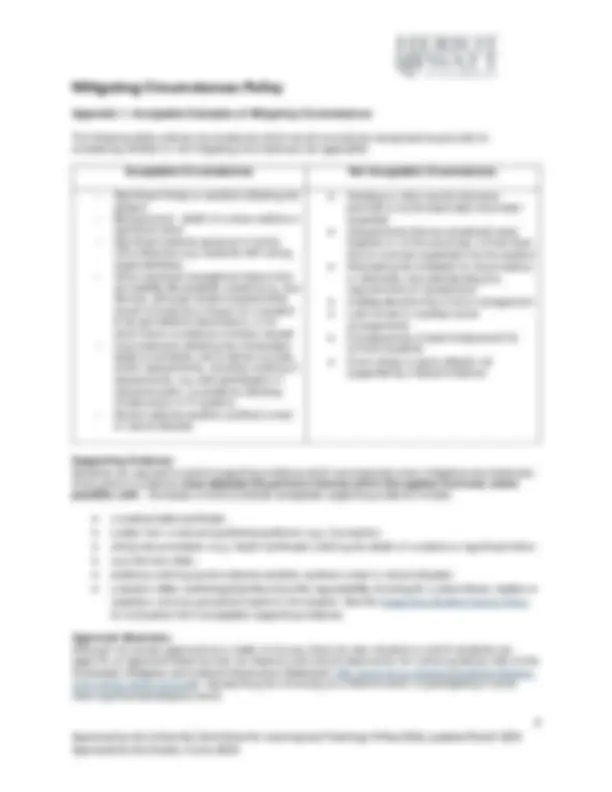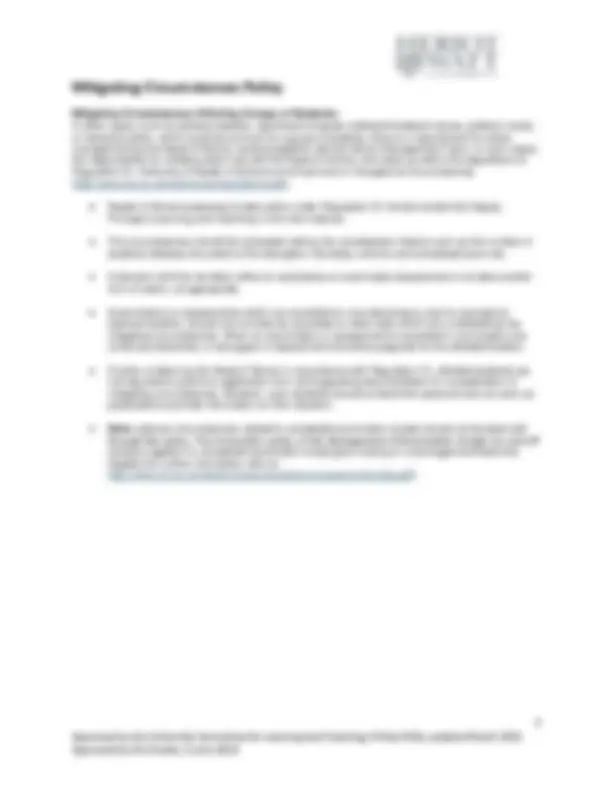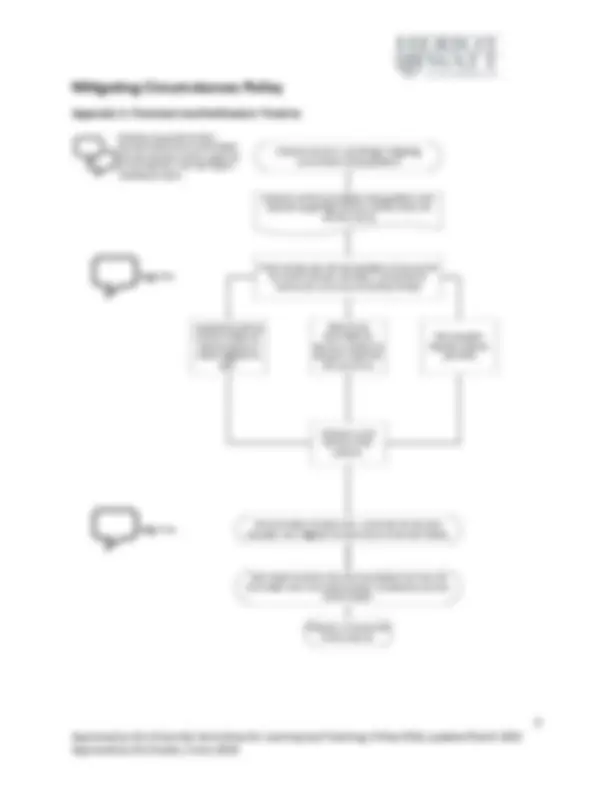






Study with the several resources on Docsity

Earn points by helping other students or get them with a premium plan


Prepare for your exams
Study with the several resources on Docsity

Earn points to download
Earn points by helping other students or get them with a premium plan
Community
Ask the community for help and clear up your study doubts
Discover the best universities in your country according to Docsity users
Free resources
Download our free guides on studying techniques, anxiety management strategies, and thesis advice from Docsity tutors
Heriot-Watt University's policy on mitigating circumstances applications, including the stages of the process, the confidentiality of student information, and the timeline for decisions. Students studying on all taught programs are covered, and acceptable circumstances are listed in Appendix 1. The policy aims to act in the best interests of students and offers a consistent and connected process from application to mitigation.
Typology: Study notes
1 / 8

This page cannot be seen from the preview
Don't miss anything!





Purpose: This document outlines University’s Mitigating Circumstances Policy and should be read in conjunction with the following documents: Submission of Coursework Policy Temporary Suspension of Studies Policy It is essential that students who have submitted a mitigating circumstances application are notified at every stage of the process (see Appendix 3 for a visual aid of the stages and notification timeline).a The underlying operating principle of this policy is that the University will always endeavour to act in the best interests of the student through establishing a consistent and connected process from application through to mitigation. Scope: The policy applies to students studying on all Heriot-Watt University taught programmes of study across all forms of assessment (including examinations). Policy Statement: There are certain circumstances which, through no fault of the student, mean that they have not been able to perform to their potential. The University defines these instances as ‘mitigating circumstances’ and this policy outlines how students can request that their studies be considered for mitigating circumstances to be applied. Heriot-Watt University has a clear and transparent set of acceptable circumstances which will normally be recognised as grounds for consideration. This also encompasses circumstances which affect groups of students (see Appendix 1). The confidential nature of information provided by students in support of an application for consideration of mitigating circumstances will be respected by Heriot-Watt University in compliance with General Data Protection Regulations (GDPR). Confidential information will only be shared with the relevant individuals within the University on a ‘need to know’ basis, all of whom are required to keep applications securely to avoid unauthorised access or other breaches of information security. This policy has been redesigned to offer students the opportunity to apply for mitigating circumstances and receive the following courses of action within ten working days from the point of submission: Accepted for referral to the Mitigating Circumstances Committee for the mitigation decision to be made; Not Accepted/Rejected (with reasons provided); or, Referred to the Mitigating Circumstances Committee for decision whether to accept or reject the mitigating circumstances. Students are advised to submit for a whole semester and are not required to submit for every individual piece of assessment. Instead of submitting multiple mitigating circumstances applications, students should summarise their entire mitigating circumstances at the end of the semester.
Students applying for mitigating circumstances should, where possible, do so as soon as possible. However, the University will accept retrospective applications until the deadline date for submissions, for all assessed work (e.g. coursework and examinations) with appropriate supporting evidence. The dates for the three semesters will be agreed prior to each academic year and published and displayed on University website, by the Registry and Academic Support Directorate. The Student has the option to request that their mitigating circumstances application applies to any, or all, of the courses to which they are enrolled on for that semester only. In exceptional and extreme circumstances, the Chair of the Mitigating Circumstances Committee may consult with the Director of Learning and Teaching (or their nominee) to determine the mitigation for a student prior to a Mitigating Circumstances Committee. In such cases, Chair’s Actions must be recorded and reported to the appropriate Exam Board. However, this would be rare and non-normal event. Any case which has not already been agreed within the Mitigating Circumstances Student Guide should be referred to the Mitigating Circumstances Committee. The Mitigating Circumstances Committee will determine the agreed course of action. The Student Guide should be updated accordingly for future similar cases. The approval process for considering whether mitigation ought to be applied is as follows: Stage One – within ten working days from receipt of a mitigating circumstances application, the Mitigating Circumstances Administrator, will review the application and ensure that the evidence submitted is complete and determine the course of action (as above). Stage Two – the Mitigating Circumstances Committee: o will review all applications that have been accepted for referral to the Mitigating Circumstances Committee and determine the mitigation decision to be made; o consider all applications that have been referred to the Mitigating Circumstances Committee for a decision and either: determine the mitigation decision to be made, where the mitigating circumstances are accepted; or, provide a reason(s) as to why the mitigating circumstances have not been accepted (i.e. rejected). Students will be advised of the outcome of Stage Two, following the applicable Exam Board. Exam Board (if required). The Exam Board must: o Consider the recommendation from the relevant Mitigating Circumstances Committee. Students will be advised of the outcome of the Exam Board.
Appendix 1: Acceptable Examples of Mitigating Circumstances The following table outlines circumstances which would normally be recognised as grounds for considering whether or not mitigating circumstances are applicable: Acceptable Circumstances Not Acceptable Circumstances
Mitigating Circumstances Affecting Groups of Students: In other cases, such as adverse weather, significant computer software/hardware issues, political unrest, or industrial action, which could be common to a group of students, there is a requirement for active management by the Head of School, working together with the Senior Management Team. In such cases, the responsibility for initiating action lies with the Head of School, who does so within the stipulations of Regulation 31: Authority of Heads of Schools and Examiners in Exceptional Circumstances (http://www.hw.ac.uk/ordinances/regulations.pdf). Heads of School proposing to take action under Regulation 31 should contact the Deputy Principal (Learning and Teaching) in the first instance. The circumstances should be evaluated, taking into consideration factors such as the number of students affected, the extent of the disruption, the delay until the next scheduled exam etc. A decision will then be taken either to reschedule an examination/assessment or to take another form of action, as appropriate. Examinations or assessments which are cancelled on one site/campus, due for example to adverse weather, should not normally be cancelled on other sites which are unaffected by the mitigating circumstances. When an examination or assessment is cancelled in one location but continues elsewhere, a new paper or assessment should be prepared for the affected location. If action is taken by the Head of School in accordance with Regulation 31, affected students are not required to submit an application form and supporting documentation for consideration of mitigating circumstances. However, such students should contact their personal tutor as soon as practicable to provide information on their situation. Note: adverse circumstances related to completed examination scripts should not be dealt with through this policy. The University’s policy on the Management of Examination Scripts (on and off campus) applies if a completed examination script goes missing or is damaged and becomes illegible (for further information refer to: http://www.hw.ac.uk/registry/resources/policymanagementscripts.pdf).
Chair’s Action will allow for timely and straightforward decisions to be made only for students where: it is clear that difficult circumstances have affected their wellbeing and ability to perform to their potential; the relevant Mitigating Circumstances Committee has well-established practice with respect to how to mitigate the circumstances reported by the student. In such cases, Chair’s Actions must be be recorded and reported to the appropriate Mitigating Circumstances Committee and Exam Board. However, this would be rare and non-normal event. Any case which was not on agreed Mitigating Circumstances Student Guide, should be referred to the Mitigating Circumstances Committee to determine the agreed course of action. The Mitigating Circumstances Student Guide should be updated accordingly for future similar cases.
Appendix 3: Flowchart and Notification Timeline Student submits a completed MC application with relevant supporting evidence (via the online MC workflow form) Within 10 days the MC Administrator will ensure the form and evidence submitted is complete and determines which course of action to take Accept and refer to MC Committee for determination of what mitigation to take. Not Accepted/ Rejected (reasons provided) Refer to MC Committee for decision whether to accept or reject the MC submission Students will be advised of the outcome. Exam Board considers the recommendation from the MC Committee when full student profile is available to consider overall impact. Student considers submitting a mitigating circumstance (MC) application Students should talk to their personal tutor/course coordinators and also consider online support to ensure that this is the best option available for them. Stage One Stage Two Students will be advised of the outcome. MC Committee will determine, where the MC has been accepted, the mitigation to recommend to the Exam Board